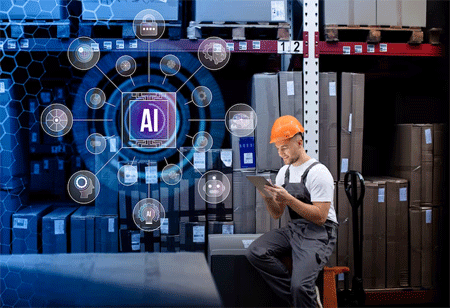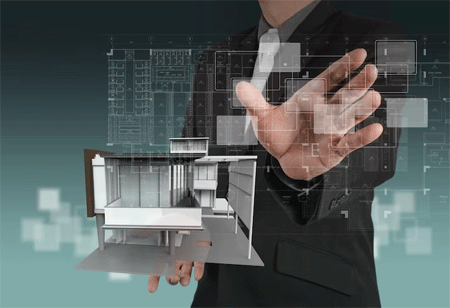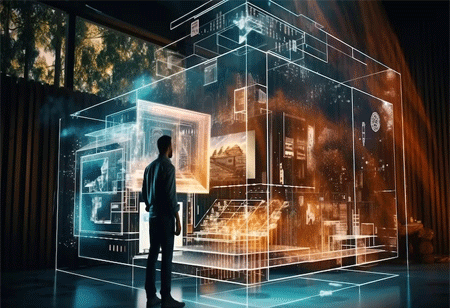
When the Architecture converges with Artificial Intelligence it reflects the story ahead of its time
Artificial Intelligence is the most wonderful and glorious invention of computer science. John McCarthy first coined the term Artificial Intelligence in 1956 at the Dartmouth Conference, of Massachusetts Institute of Technology (MIT). In 1969, Charles Rosen invented a general-purpose mobile robot and named it ‘Shakey’. This robot has cameras and touch sensors which can be controlled by a remote. In 1997, a group of scientists from the renowned company IBM has developed a super computer called ‘Deep Blue’ by using the artificial intelligence technology. This computer has defeated the world chess champion Garry Kasparov.
In 2002, a first of its kind robotic vacuum cleaner was invented and introduced in the market for commercial use by using AI technology. From 2005 till 2019, technology has already become an integral part of human life by gifting innumerable smart devices. In the boom of technological revolution human intelligence is fading out against this wonder of science. The invention of automatic car is one of the exceptional wonders of this system. In Automatic cars there is no clutch as the gear system is purely controlled by the car itself, only one needs to operate the steering wheel properly the car will go on its own by calculating the speed and traffic. In few years the more refined version of automatic car will be coming in which the person need not press the break also the car will calculate and stop on its own.

What is Artificial Intelligence?
It is like the software which needs the data to process. So, all you have to do is to put the appropriate data in turn it will get processed by the system itself. It has the capacity to process large amount of processed data that are incorrect and properly given otherwise it will deliver error as an ultimate error. It can be used with Java, C, python, and more, though they are not a cent percent match to this system.
Chronology of the Evolution of Artificial Intelligence in Architectural Science
Human is a social animal. It always tries to create an environment which will enhance its living by providing them utmost comfort and well-being. With the advent of civil sciences, the Architectural science has come up with truly exceptional innovations. Innovation and invention are likely very similar to each other. Innovation is the refined version of invention. By holding the hands of innovation, architecture and AI have created a giant-sized evolution. The genesis of new technologies has led to the creation of innovation in architecture. The four pillars of architecture are modularity, computational design, parametricism and Artificial Intelligence.
In the early 1920’s the modular system provided a clear picture and know how methods of architecture which created the language and grammar through which designs can be made.
In 1959, Professor Patrick Henratty penned ‘PRONTO’ the first specimen of CAD (Computer Assisted Drawing) software, keeping in mind about the civil engineering designs.
In the ‘Notes on the Synthesis of Form’ (1964) and in ‘a pattern language’ (1968) Christopher Alexander explained about the working process of computer to address the question regarding shape designs.
During the early 1970’s professor of Massachusetts Institute of Technology Professor Nicholas Negropante created the Architecture machine Group and, in his book, The ‘Architecture Machine’ he summarized the motto of the group which is to research and survey how machines are working, how it can be improved and renovated and refined in a new manner.
"AI is the beginning of a new epoch of human civilization… a watershed moment "- Eric Schmidt, Former CEO & Chairman of Google
Applications of AI in Architecture
In Research & Inspection: An architecture designer passes numberless days and nights to create an appropriate design for a perfect plot. The integration of AI with architecture enabled them to put limitless data to process at the same time. A designer can put the data looking at the preferences and instruction by the clients and process it in no time with the help of a computer. Today, for inspection purpose there are many innovative results like AI drones, Augmented Reality (AR) for Visualization, smart cameras and so on which help in inspecting about every minute movements and aspects of infrastructure.
In Large Scale Infrastructure: Large scale infrastructures like museums, stations, airports, harbors, movie halls, and shopping malls need specific designs to accommodate large number of people at a time. AI technology helps in this by putting the data about the specification and detailed information about the spaces to be used. 3D AI Construction Inspection, Spacemaker, Adobe Firefly, Maket.ai, Sidewalklabs, Digital Blue Foam and many more inventions have escalated security and surveillance of properties, homes and apartments, residential projects, construction sites and so on.
Genesis of Smart City: The whole concept of smart city comes when Artificial Intelligence intercept with architecture. The designs are made by processing the real-time data which in turn helps to determine the size, structure, number of people to accommodate, position of marketplace, bus stops, and shopping malls so that the whole city gets connected in a string. Cloud AI-Powered Robots, Cognitive Power Plants, Intelligent Security Cameras, Improved Commercial Chatbots, IoT-Enabled Park Benches are being used to convert a city into the smart city.

The Advent of AI Art Generator
With the advancement of AI generator, it became like child’s play to get newly advanced ideas, model demonstration. It can be done through an application called ‘Starryai’ it can create a virtual home design which is a very technical laborious job and needs expertise knowledge with the 3D enabled 360-degree view with interior design and exterior environment. This will help the architects to create design as well as to demonstrate it to the buyers.
Conclusion
The convergence of AI and Architecture is a boon for the Architects at the same time it creates few challenges. It can be said without any doubt that AI is just a tool which will follow the instructions and inputs given by its user but it can never copy or create the intelligence, sensibility and intuition of an architect. Moreover, it’s a high-end cutting-edge technology with high cost so it’s not very easy to maintain and sustain good results because the loop-holes are not easily identifiable. Besides having few shortcomings, it can be concluded that AI technology will thrive more in the foreseeable future.
We use cookies to ensure you get the best experience on our website. Read more...
Copyright © 2025 HomesIndiaMagazine. All Rights Reserved.